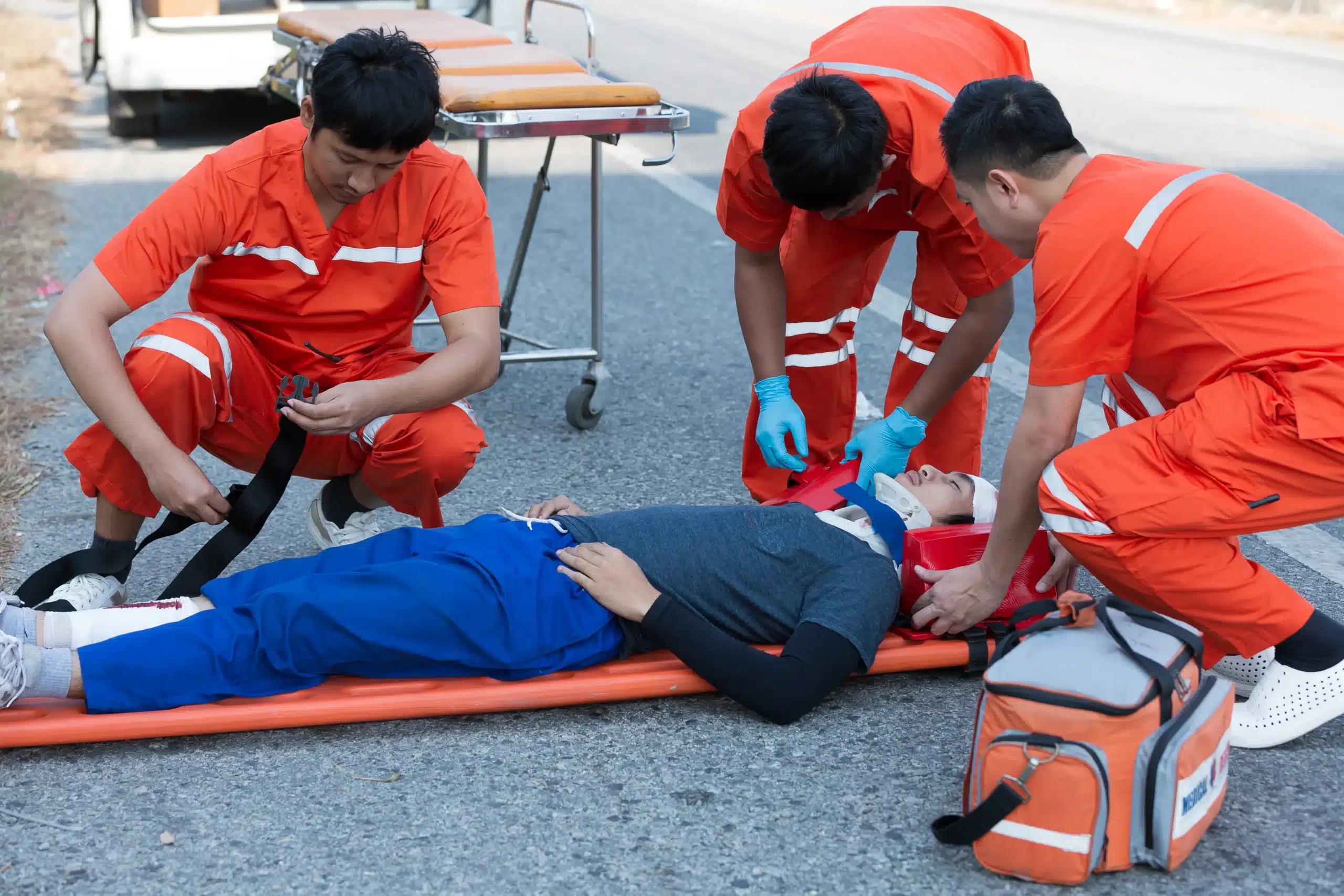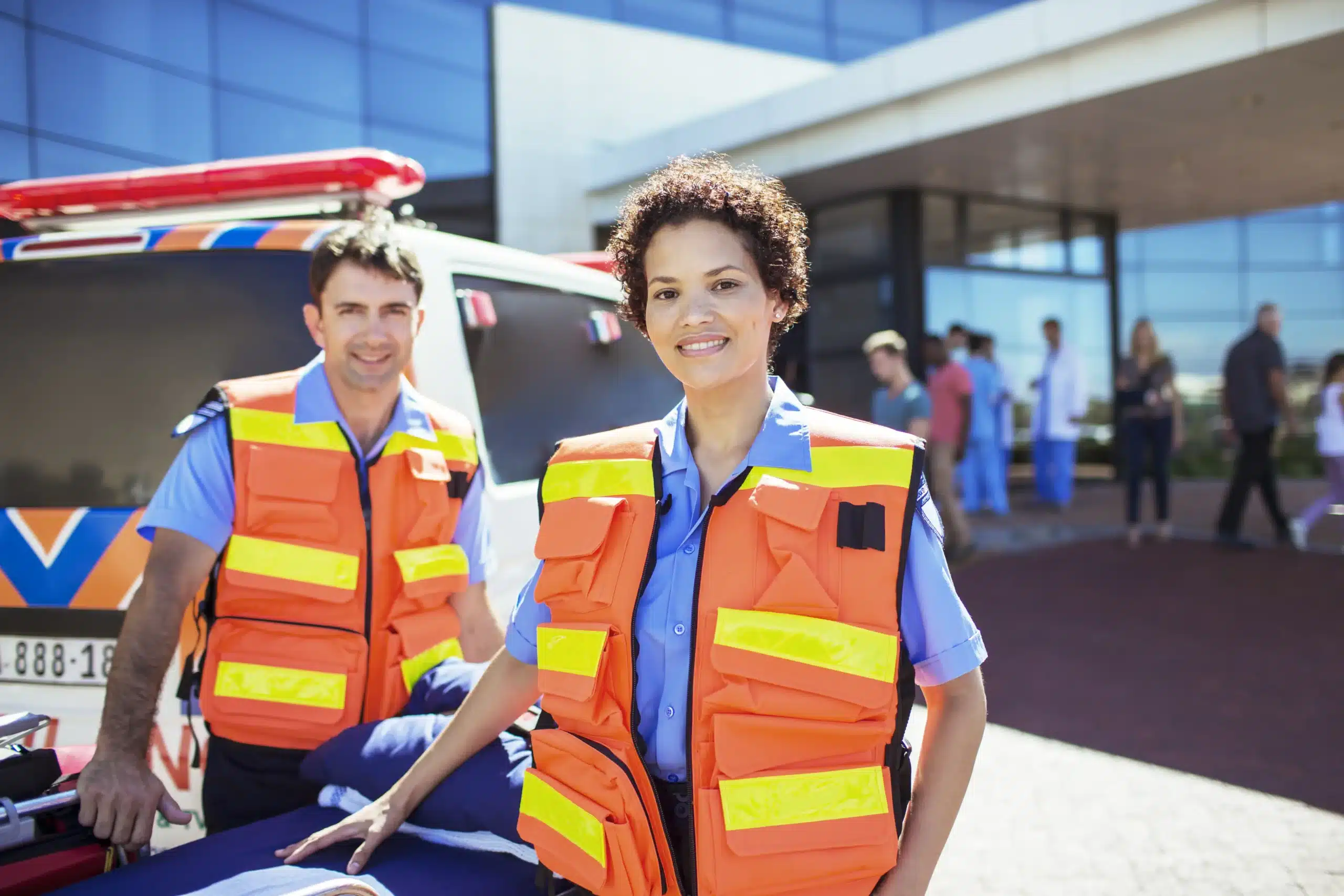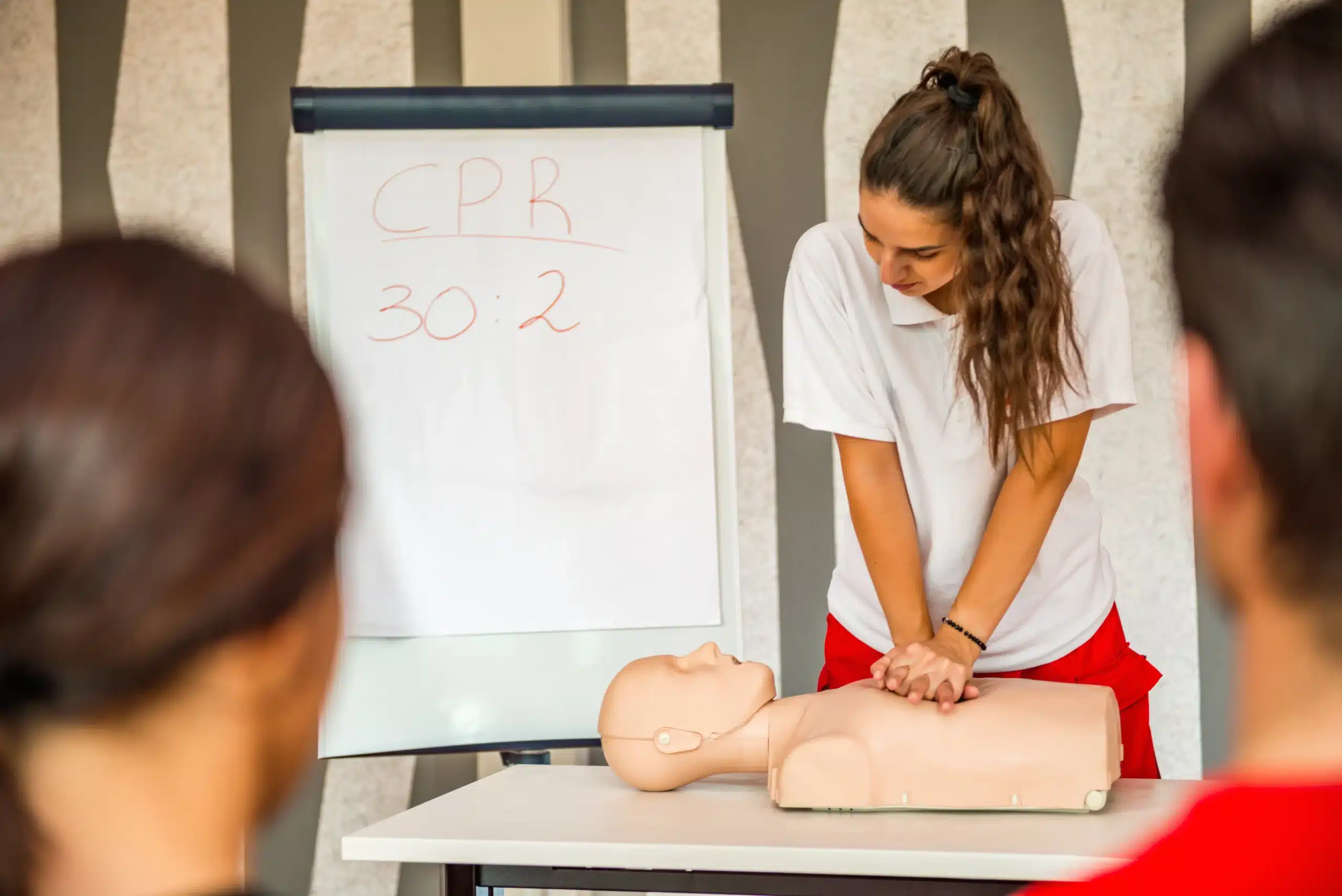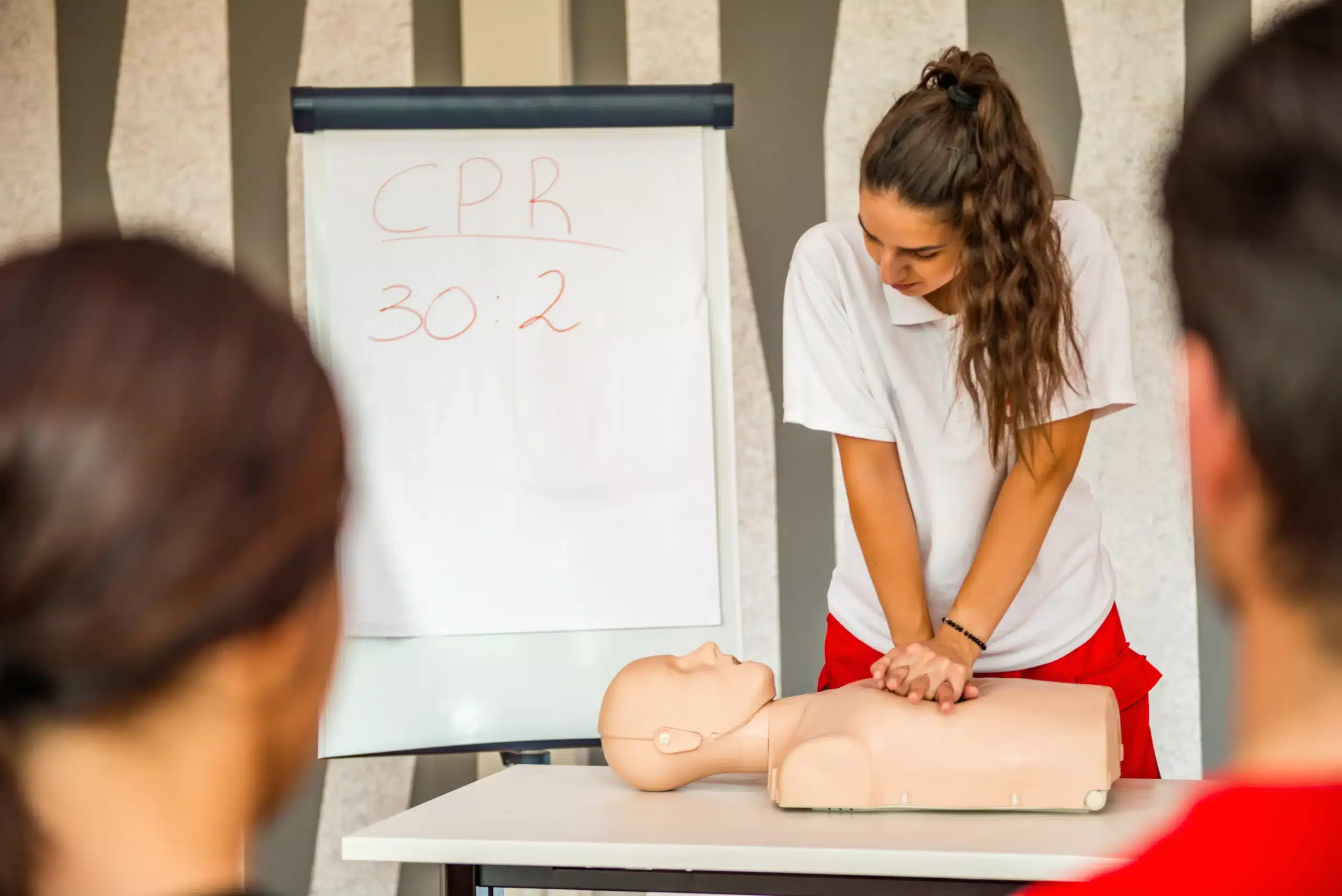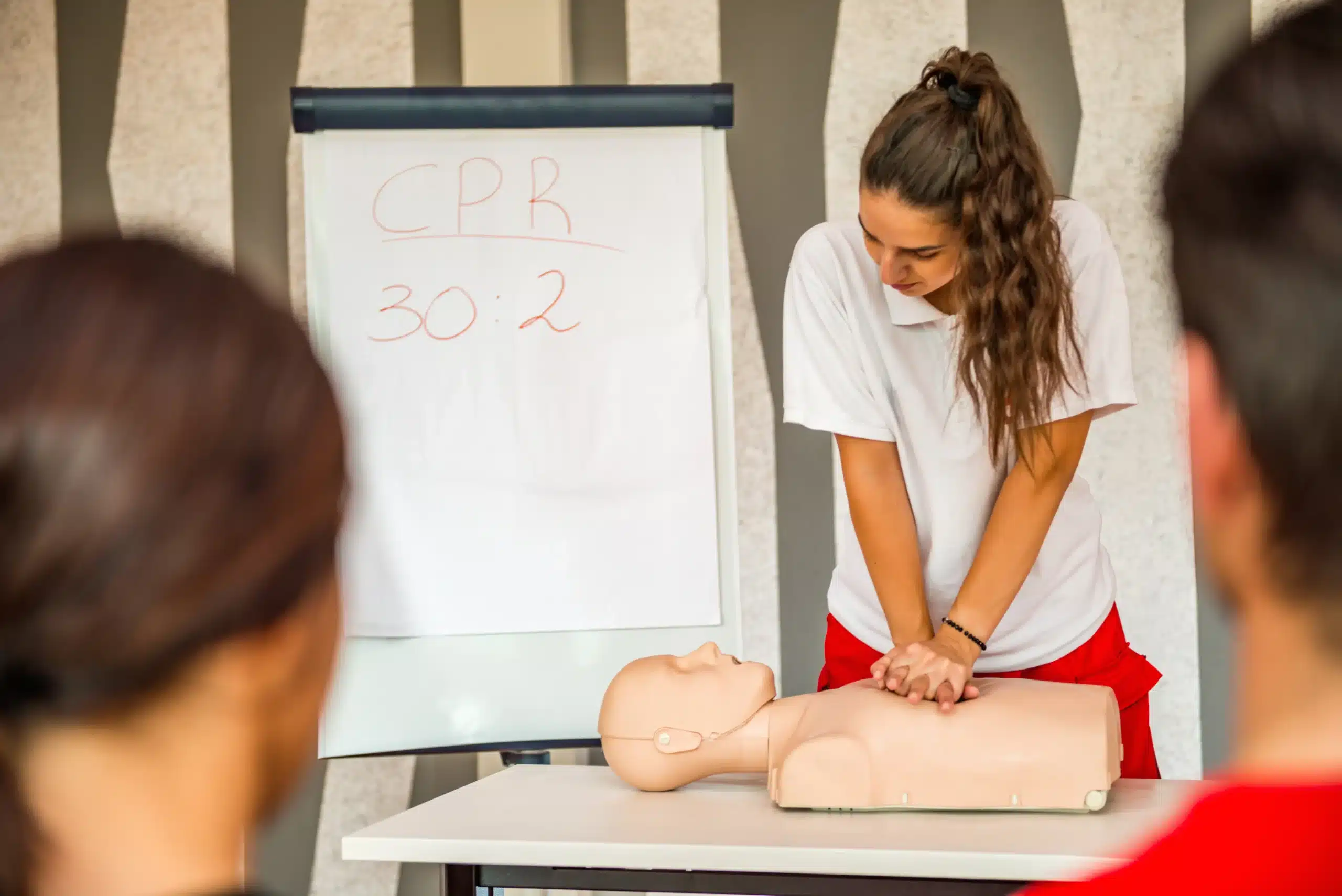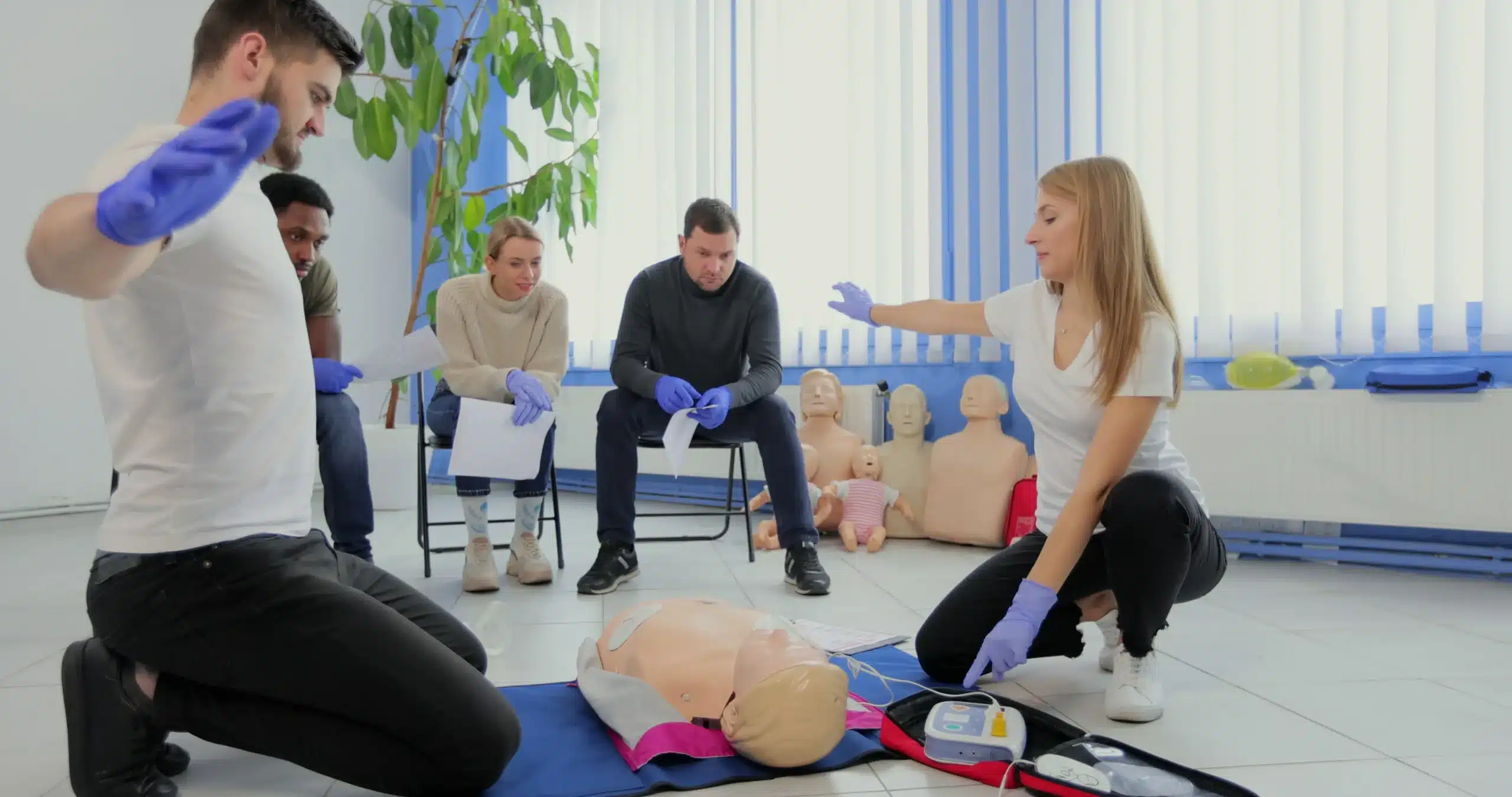In a world where the unexpected can happen at any moment, knowing first aid is more than just a good idea—it’s a crucial life skill. This guide is your roadmap to finding “first-aid classes near me” and becoming prepared for anything. We’ll cover the basics of first-aid training, including different course types, certification options, and what to expect in a typical class. You’ll learn how to find reputable training providers, compare costs, and choose the best learning format for your schedule. Whether you’re a healthcare professional seeking advanced certification or a parent wanting to be prepared for childhood mishaps, we’ll help you find the perfect first-aid training in Concord, CA, and nearby areas.
Key Takeaways
- First aid skills are essential: Equipping yourself with first aid knowledge empowers you to confidently handle medical emergencies, potentially saving lives and minimizing harm in a variety of situations.
- Choose the right class: Explore different first-aid class formats (in-person, online, or blended) and certification levels to find the best fit for your schedule, learning style, and career aspirations. Consider factors like cost and provider credentials.
- Local resources simplify training: Concord CPR Classes offers convenient and affordable AHA-certified courses in Concord, CA, covering a range of certifications, including first aid, CPR, BLS, ACLS, and PALS. They serve Concord, Walnut Creek, and Pleasant Hill.
What are First-Aid Classes?
First-aid classes equip you with the skills to handle medical emergencies until professional help arrives. From minor cuts and burns to more serious situations like choking or a heart attack, these courses empower you to respond effectively and potentially save a life. Different types of first-aid classes cater to various needs and skill levels. Let’s explore some common options.
Basic First Aid
Basic first-aid courses cover essential life-saving techniques. You’ll learn how to assess a scene, control bleeding, manage burns, care for sprains and fractures, and handle common medical emergencies. Many basic first-aid classes also include CPR and AED instruction, teaching you how to perform cardiopulmonary resuscitation and use an automated external defibrillator. These combined courses offer a well-rounded foundation in emergency response. Concord CPR Classes offers a range of AHA-certified courses, providing comprehensive training for various situations.
CPR and AED Training
CPR and AED training focuses specifically on responding to cardiac arrest. You’ll learn how to recognize the signs of a heart attack, perform chest compressions, provide rescue breaths, and operate an AED. This training is crucial for anyone who might encounter a cardiac emergency, from healthcare professionals to everyday citizens. CPR training is often combined with basic first aid to provide a comprehensive skill set for handling various medical emergencies.
Advanced Cardiovascular Life Support (ACLS)
ACLS certification is an advanced level of training designed for healthcare providers. It builds upon basic life support skills, covering topics like airway management, intravenous access, and pharmacology in emergency situations. ACLS certification is typically required for doctors, nurses, paramedics, and other medical professionals who work in critical care settings.
Pediatric Advanced Life Support (PALS)
PALS certification is similar to ACLS but focuses specifically on the care of infants and children. It covers pediatric-specific emergencies, including respiratory distress, shock, and cardiac arrest. PALS certification is essential for healthcare providers who work with young patients, such as pediatricians, pediatric nurses, and emergency medical technicians.
Specialized First-Aid Courses
Beyond basic and advanced life support, various specialized first-aid courses cater to specific needs and environments. These might include wilderness first aid, which teaches you how to handle medical emergencies in remote locations, or pet first aid, which focuses on caring for injured animals. Other specialized courses cover topics like oxygen administration, water safety, and emergency medical response. Concord CPR Classes recognizes the importance of specialized training, offering access to a variety of courses.
Find First-Aid Classes Near You
Finding the right first-aid class is easier than you think. Here’s how to locate training near you:
Search Online
Start with a simple online search. The American Red Cross website, for example, has a searchable database to help you find first-aid and CPR classes by zip code. You can filter by class type and date, making it easy to find one that fits your schedule. Many other organizations, like the National Safety Council, also offer online class finders.
Check Local Resources
Your local fire department or community center is another great place to look. Many fire departments offer first-aid and CPR training to the public. Community centers often host classes on a variety of topics, including first aid. Check their websites or give them a call to see what’s available. Hospitals and medical centers also frequently offer first-aid and other safety training courses. Consider checking with your local YMCA or recreation department, too.
Evaluate Provider Credentials
Before signing up for a class, do a little research on the training provider. Look for organizations with a strong track record and certified instructors. Make sure the curriculum aligns with nationally recognized guidelines, such as those from the American Heart Association or the American Red Cross. Reading reviews from past participants can also give you a sense of the quality of instruction. A reputable provider will readily offer information about their certifications and teaching experience.
How Much Does First-Aid Training Cost?
Knowing the cost of first-aid training is an important step in finding the right class. Let’s break down typical costs, factors that influence pricing, and ways to save.
Typical Prices
Basic first-aid and CPR courses usually start around $75. More advanced certifications, such as ACLS (Advanced Cardiovascular Life Support) and PALS (Pediatric Advanced Life Support), generally range from $150 to $250. Remember that these are just averages, and prices can vary.
Factors Affecting Cost
Several factors influence the final cost of your first-aid training. The level of certification you pursue plays a big role. For example, a basic first-aid course will typically cost less than a specialized course like wilderness first aid. The training provider also matters. Different organizations and instructors have different pricing structures. Location can also influence cost, with courses in major metropolitan areas sometimes costing more.
Discounts and Financial Aid
Look for ways to reduce the cost of your training. Many providers, including Concord CPR Classes, offer discounts for group registrations. This can be a great option if you’re signing up with friends, family, or coworkers. Some organizations may also offer financial aid or payment plans, so it’s always a good idea to ask. Concord CPR Classes is committed to providing affordable, high-quality training and offers a low price guarantee. Check their website for details.
Choose Your Class Format
Finding the right first-aid class means choosing a learning environment that suits your needs and schedule. Let’s explore the pros and cons of in-person, online, and blended learning formats.
In-Person Training
In-person training offers hands-on learning and direct interaction with instructors. This format is ideal for mastering practical skills, like CPR and bandaging, because you receive immediate feedback and can practice techniques in a controlled setting. Concord CPR Classes offers a range of American Heart Association (AHA) certified courses, including Basic Life Support (BLS), Advanced Cardiovascular Life Support (ACLS), Pediatric Advanced Life Support (PALS), and comprehensive first-aid training. This face-to-face approach allows you to ask questions, clarify doubts, and build confidence in your abilities. However, in-person classes require a fixed schedule and may not be as flexible as other options. Check out our first-aid training guide for more information.
Online Courses
Online courses provide a convenient alternative for those with busy schedules or limited access to in-person training locations. You can learn at your own pace, revisit materials as needed, and often complete the coursework from anywhere with an internet connection. Concord CPR Classes provides high-quality, affordable online training, offering AHA-certified courses and group discounts. Online courses are generally more affordable than in-person classes. However, they may not meet all workplace requirements, so it’s essential to check with your employer or certifying body. Keep in mind that online-only courses typically don’t include the hands-on practice component required for certification, so you might need to supplement your learning.
Blended Learning
Blended learning combines the flexibility of online learning with the practical application of in-person skills sessions. You’ll typically complete the theoretical coursework online at your own pace, then attend a shorter, in-person session to practice skills and demonstrate competency. This format is particularly beneficial for courses like ACLS and PALS, which cover complex life support techniques for adults, children, and infants. The Red Cross offers blended learning options, allowing you to learn the material before practicing hands-on skills. Blended learning offers a good balance of flexibility and practical training, making it a popular choice for many students.
Get Certified in First Aid
Getting certified in first aid equips you with the skills to handle medical emergencies. Whether you’re dealing with a minor cut or a more serious situation, knowing what to do can make all the difference. This section covers the types of first-aid certifications available and how to renew your existing credentials.
Types of Certifications
Several first-aid certifications cater to different needs and skill levels. From basic first aid and CPR/AED training to advanced certifications like ACLS and PALS, there’s a course for everyone.
- Basic First Aid and CPR/AED: This foundational course covers essential life-saving skills, including CPR, using an AED, and managing common injuries like cuts, burns, and sprains. These combined courses are often a starting point and fulfill requirements for various jobs and volunteer opportunities. You can find more information on CPR and first-aid training in Concord.
- Advanced Cardiovascular Life Support (ACLS): Designed for healthcare professionals, ACLS certification focuses on advanced life support techniques for adults, including managing respiratory and cardiovascular emergencies.
- Pediatric Advanced Life Support (PALS): Similar to ACLS, PALS certification focuses on providing advanced life support to infants and children. It’s crucial for healthcare providers working in pediatrics or emergency medicine.
- Specialized First-Aid Courses: Depending on your interests or profession, you might consider specialized courses like wilderness first aid, which teaches you how to handle medical emergencies in remote locations.
Renew Your Certification
First-aid certifications typically expire after a certain period, usually every two years. Renewing your certification ensures your skills stay current and you’re prepared to respond effectively in an emergency. BLS recertification is readily available and often involves a shorter refresher course covering essential updates and techniques. Check with your certifying organization or a local training center like Concord CPR Classes for renewal options. They offer competitive rates and a low-price guarantee, making it easy and affordable to maintain your certification.
What Happens in a First-Aid Class?
So you’ve decided to learn first aid—fantastic! Now you’re probably wondering what to expect. First-aid classes offer a blend of instruction and hands-on learning, covering essential skills to handle various emergencies. Let’s break down what a typical first-aid class entails.
Course Content
First-aid courses cover a range of topics, from basic life support (BLS) to more specialized areas. You’ll learn to assess a situation, respond to common injuries like cuts and burns, and manage medical emergencies such as choking or a heart attack. Many classes, like those at Concord CPR Classes, align with American Heart Association (AHA) guidelines, ensuring you receive up-to-date and comprehensive training. Expect to learn about recognizing the signs of a stroke, administering CPR, using an AED, and providing basic wound care. The curriculum often includes instruction on handling allergic reactions, recognizing signs of shock, and managing fractures and sprains.
Hands-On Practice
Learning first aid isn’t just about absorbing information; it’s about developing practical skills. A significant portion of your class will involve hands-on practice. You’ll perform CPR on mannequins, practice bandaging techniques, and learn to use an automated external defibrillator (AED). This practical experience is invaluable for building confidence and ensuring you can apply your knowledge in a real emergency. For example, Concord CPR Classes offers ACLS and PALS courses with hands-on training for life support techniques for adults, children, and infants. This hands-on component is crucial for mastering the skills needed to respond effectively under pressure.
Assessments
Most first-aid courses include assessments to ensure you’ve grasped the key concepts and skills. These assessments might involve written tests, practical demonstrations, or a combination of both. These assessments are designed to help you gauge your understanding and identify any areas where you might need additional practice. Qualified instructors, often holding certifications like a First Aid at Work (FAW) certificate or equivalent medical credentials, typically conduct these assessments. This ensures the training meets established standards and prepares you to confidently handle emergencies. You can find more information on choosing a qualified first-aid training provider here.
Choose the Right First-Aid Class
Picking the right first-aid class is a big decision. It’s an investment of your time and money, so you want to make sure it’s the right fit. Here’s how to choose the best class for you:
Assess Your Needs
Before browsing first-aid courses, think about why you want to learn first aid. Are you required to get certified for your job, or are you looking to be prepared for emergencies at home? Understanding your motivation will help you choose the right level of training. If you’re looking for reliable training, choosing a quality provider is key, as emphasized by CPR Certification Now in their guide on selecting a first-aid training provider. Also, consider your current knowledge. Are you a complete beginner, or do you have some prior experience? Knowing your starting point will help you find a class that builds upon your existing skills or provides a solid foundation.
Align with Your Goals
Once you understand your needs, think about your goals. Do you want a basic understanding of first aid, or are you interested in a more advanced certification like ACLS or PALS? Concord CPR Classes offers a variety of AHA-certified courses, ensuring your training meets nationally recognized standards. If you’re pursuing first aid training for a specific job, check if there are any required certifications. Some professions require specific training beyond basic first aid. Concord CPR Classes offers a comprehensive approach to safety training, covering everything from basic CPR and first aid to more advanced certifications. This allows you to choose the training that best aligns with your career aspirations.
Balance Time and Budget
First-aid training comes at a cost, both in terms of time and money. Basic first-aid and CPR courses usually start around $75, while more advanced certifications can range from $150 to $250, according to Brentwood CPR Classes. Consider how much time you can commit to a class. Some courses are offered over a weekend, while others are spread out over several weeks. Concord CPR Classes offers affordable AHA-certified courses, often with group discounts and a low-price guarantee. If cost is a concern, explore options for financial aid or discounts. Some organizations offer reduced rates for students, seniors, or groups. Don’t let budget constraints prevent you from gaining these valuable skills.
Why Learn First Aid?
Knowing first aid can help you in unexpected situations, at home, at work, or out in your community. It’s a valuable skill set that can make a real difference.
Prepare for Emergencies
Life is unpredictable. Accidents and medical emergencies can happen anytime, anywhere. First-aid training equips you with the skills to respond effectively in these critical moments. Whether it’s a minor cut or a more serious situation, you’ll be prepared to provide immediate care, potentially preventing further complications and alleviating pain. Choosing the right first aid training provider is crucial for receiving accurate and reliable training. Being prepared can bring peace of mind, knowing you can handle emergencies as they arise.
Advance Your Career
First-aid certification can be a valuable asset in many professions. Some jobs require it, while in others, it demonstrates valuable skills and a commitment to safety. For example, many healthcare roles require certifications from organizations like the American Heart Association, so finding a training provider offering AHA-certified courses is essential. Even if it’s not a job requirement, having first-aid knowledge can make you a more desirable candidate and open up new opportunities. CPR training in Concord offers various AHA-certified courses.
Make a Difference
Learning first aid empowers you to help others in need. You can provide assistance in various situations, from everyday injuries to more serious incidents. Understanding the importance of this training starts with debunking common first aid myths. In a crisis, your actions can truly make a difference, potentially even saving a life. Knowing how to administer proper first aid can be the difference between life and death, especially in critical situations. It’s a rewarding experience to know you have the skills to help those around you.
First-Aid Training in Concord, CA
Finding the right first-aid training can feel overwhelming, but it doesn’t have to be. This section breaks down your options in Concord, CA, to help you make an informed decision. Whether you’re a healthcare professional, a concerned parent, or simply want to be prepared, there’s a course out there for you.
Concord CPR Classes
Concord CPR Classes offers a comprehensive selection of AHA-certified courses, including first aid, CPR, BLS, ACLS, and PALS. They focus on providing high-quality, affordable training, with a low-price guarantee and discounts for group registrations. Their use of the American Heart Association’s RQI program makes quick certification possible, which is especially helpful for busy medical professionals. Serving Concord, Walnut Creek, and Pleasant Hill, their central location makes them accessible to many in the area. They offer courses in BLS, ACLS, and PALS.
American Red Cross
The American Red Cross is a nationally recognized name in first-aid training. While they don’t have a dedicated training center in Concord, their website offers a course locator to find classes nearby. Be sure to check their site for the most up-to-date information on class schedules and locations. When choosing any provider, including the Red Cross, look for evidence of comprehensive and current training materials.
American Heart Association
While the American Heart Association doesn’t directly offer classes, they set the standards for many first-aid courses. Look for training centers, like Concord CPR Classes, that offer AHA-certified programs. This certification ensures your training aligns with nationally recognized guidelines. AHA certification is often preferred by employers and demonstrates a commitment to high-quality training. For those seeking more information on first aid best practices, the American Heart Association publishes numerous articles and resources.
Local Community Colleges
Community colleges often offer first-aid and CPR courses as part of their continuing education programs. Check with nearby colleges like Diablo Valley College to see what they offer. These courses can be a good option for those looking for a more structured learning environment.
Hospitals and Medical Centers
Hospitals and medical centers in Concord and surrounding areas, such as John Muir Health, may also offer first-aid training courses. Check their websites or contact their education departments for more information. These courses are sometimes geared towards healthcare providers but may also have options for the general public.
Related Articles
- First-Aid Training in Concord: Your Complete Guide – Concord CPR Classes
- CPR & First-Aid in Concord: Your Guide to Certification – Concord CPR Classes
- Why CPR is Critical in Healthcare
- ACLS Certification in Concord: Your Complete Guide – Concord CPR Classes
- Pediatric Advanced Life Support (PALS) in Concord, CA – Concord CPR Classes
Frequently Asked Questions
What’s the difference between basic first aid and advanced life support?
Basic first aid focuses on immediate care for common injuries like cuts, burns, and sprains, and also includes CPR. Advanced life support, like ACLS and PALS, goes further, covering complex medical emergencies and is typically for healthcare professionals. Basic first aid provides a foundation, while advanced life support builds upon those skills for more critical situations.
How do I choose the right first-aid class for me?
Consider your needs and goals. Why do you want to learn first aid? What do you hope to achieve? If it’s for a job, check required certifications. Also, think about your learning style. Do you prefer in-person instruction, online flexibility, or a blended approach? Finally, balance your schedule and budget with the course options available.
How can I find first-aid training near me?
Start with an online search. Check websites like the American Red Cross or the National Safety Council, which often have class finders. Also, explore local resources like community centers, fire departments, and hospitals. They often offer training courses to the public.
How much does first-aid training typically cost?
Costs vary depending on the course level and provider. Basic first aid and CPR classes often start around $75, while advanced certifications like ACLS and PALS can range from $150 to $250. Look for potential discounts, such as group rates or financial aid options, to help manage the cost.
What if my first-aid certification expires?
Most certifications require renewal, usually every two years. Contact your certifying organization or a local training center for recertification options. There are often refresher courses available to update your skills and keep your certification current.



